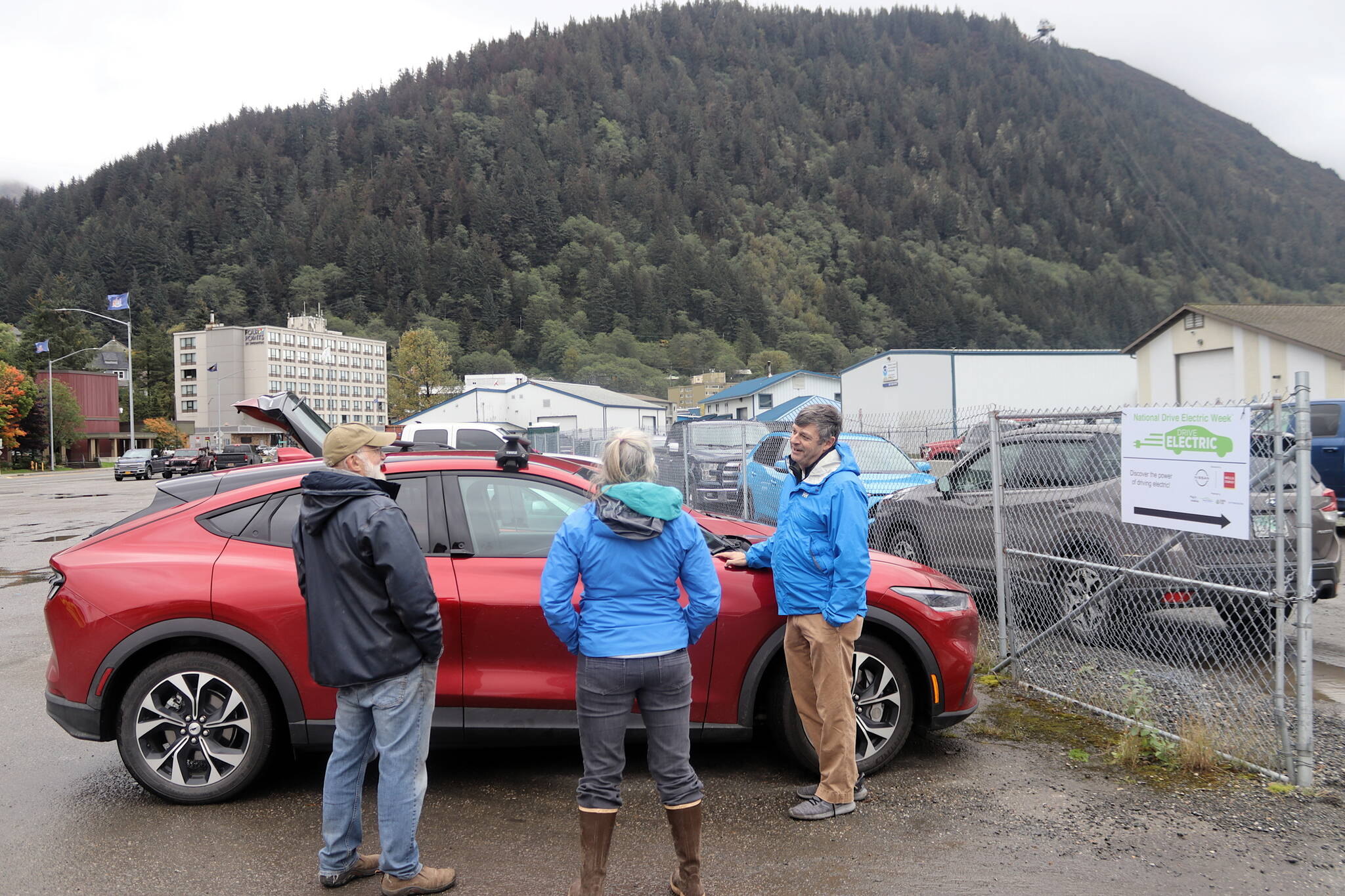Jim Scheufelt said buying a Ford Mustang to commute to the high school where he teaches is an obvious choice since it’s always the model he’s driven because his father worked for the auto company. But the new vehicle he bought in June definitely wasn’t his father’s old model since it’s powered by electricity rather than the legendary gas-guzzling V8.
Scheufelt, who’s lived in Juneau for the past 25 years, said he also installed a two-outlet electric vehicle charger at his house since his wife also has one of the battery-powered Mustangs known as the Mach-E, plus their son is now driving a Ford Focus EV she previously owned.
“We’re an all-EV household right now,” he said, while showing his new car to a couple of inquisitive people Saturday during the ninth annual Juneau EV & EBIKE Roundup downtown across from Centennial Hall.
Scheufelt is something of an outlier for both his preferred model of EV — Nissan Leafs were the dominant model registered for the roundup — and opting for electric in a town when fuel still rules. But the power balance for the latter is shifting rapidly, according to organizers of Saturday’s event who say Juneau is one of the fastest-growing EV communities in the country.
“When we started this event nine years ago there were six electric vehicles in Juneau,” Duff Mitchell, managing director of Juneau Hydropower, told the several dozen attendees. “Now, we have 600 to 700.”
Increasing efforts are also being made by Juneau’s municipal government, one of the sponsors of this year’s roundup, including public transit, Mitchell said.
“We’re the first community with electric busses in Alaska and we have more on the way,” he said.
An “alternative” alternative vehicle new to the roundup this year was e-bikes being shown by two local dealers, which Mitchell said are proving increasingly popular among local residents due to the proliferation of steep hilly streets and trails in town.
Several local politicians were among the speakers and attendees, as was U.S. House candidate Nick Begich III who is visiting Juneau this weekend for a variety of campaign-related events. The Republican from Anchorage, who noted he used to work for Ford, invoked one of his key platform themes in his brief address to the crowd, saying it’s critical to make better use of the state’s mining industry.
“We’ve got to open all the mineral resources we can to make sure we have the vertical integration we need to make this technology work,” he said.
Free “conventional” fuel for attendees was available in the form of burgers and other edibles (and the annual Capital Brewfest conveniently happened to be in the adjacent parking lot). Manning the grill in the wind and occasional rain was Rodney Hesson, assistant business manager of the local IBEW chapter, an event-supporter who noted members install electric chargers at people’s homes and are working on larger-scale projects such as the under-construction Juneau Hydropower project at Sweetheart Lake.
Hesson admitted at the moment he’s still driving a gas-powered pickup truck, but hopefully not for long.
“My wife wants to hold out for the (electric) VW Bus they have coming,” he said.
While such a VW might by an eye-catching mix of nostalgia and novelty, it’s not even close to the visual voltage of the vehicle Eric Caldwell, a lifelong Juneau resident, is reserving in anticipation of delivery next year. While his wife, Sara, drives a “common” Nissan Leaf, his power pick is an Aptera, a three-wheeler advertised as the world’s first solar-electric vehicle — and, yes, he thinks it’ll function just fine in one of the rainiest cities in the country.
“If it picks up 20 miles in Ireland (on solar alone), it will pick up at least 10 in Douglas,” he said, noting it also has a “traditional” EV battery with a 400-mile range.
• Contact Mark Sabbatini at mark.sabbatini@juneauempire.com

